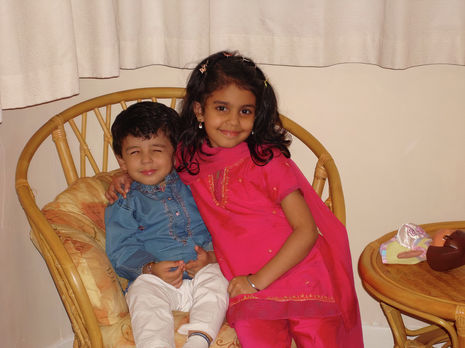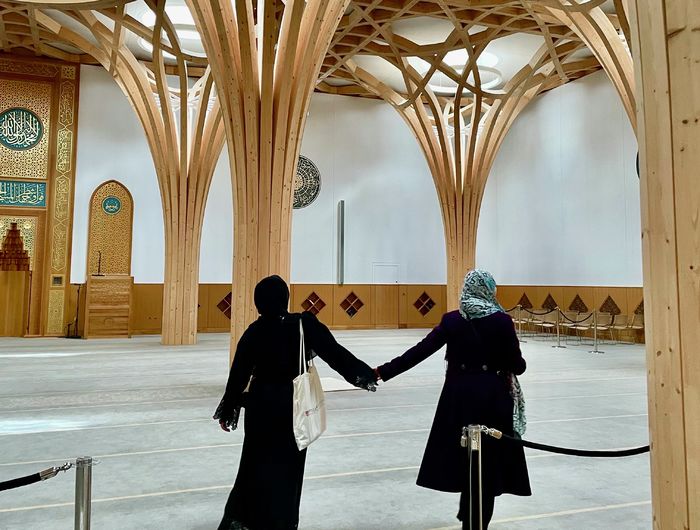A multitude of religious labels
Deputy Features Editor Tanya Singh challenges our imposition of religious labels onto something fluid and personal

The last time I went to the mandhir was 2 months ago. Rather than out of some distant sense of religious duty, I went because my family were invited for a puja by some good friends of ours. Before that, I hadn’t stepped foot into a temple for at least 7 years.
With annual celebrations of several Hindu festivals, from Diwali to Navratri, it’s not as if I’m completely isolated from religion. There is something quite special about dressing up in a traditional Indian lehenga, listening to the pandit’s message and subsequently quizzing my mum on the meaning behind it as we eagerly stand in line for langar, the flavourful food served in temples and gurdwara.
“God, souls, death and all such topics were discussed in an unreserved manner”
But I don’t understand the rituals and have never truly tried to either. I know a large assortment of aartis by heart, but none of the lyrics have any meaning to me. Similarly, I’m the first to jump on the opportunity to try the prasad being offered after the puja and yet until recently, I had no clue that each type of prasad is explicitly linked to a particular God. My wonder and enjoyment at such festivals stem from the fact that I’m perceiving the beauty of my culture and feel inexplicably tied to it, as opposed to a feeling of reverence for Hindu traditions.
My lack of understanding about Hinduism, let alone devotion to it, has recently made me question the label that I’ve been tagged with my whole life. When asked “What religion are you?” in primary school, my answer was always the same: “My dad’s a Sikh and my mum’s a Hindu, so I guess I’m both!” In the countless forms, applications and surveys I’ve spent hours filling out in my adolescence, I’ve always ticked “Hindu” in the religion section, boxing myself in with a single pen-stroke.
But that’s not entirely true. Although my dad may be a Sikh and my mum may be a Hindu, their understanding of their own religious beliefs is complex in itself, and they’ve never pressured me to inherit any of them. I credit a large part of that to my mother. Her upbringing was defined by a fauji, or military environment which encouraged not only the tolerance of all faiths, but participation in them too. I always found it fascinating that while the family followed Hindu and Sikh practices at home, my mum was sent to a convent school. It’s not too surprising, therefore, that my childhood was one of immense openness, and although I was taught the basics of all religions, it wasn’t some sort of multiple choice question where I had to adhere to the doctrines of a specific organised religion for the rest of my life. Unlike the forms which I had grown used to, my identity was no longer constricted to four ink walls - there was no box that needed ticking, no decision that needed to be made. God, souls, death and all such topics were discussed in an unreserved manner, and one person’s opinion on it was just as valid as another’s.
“My complex and unclear relationship with God and faith cannot be summed up under one term”
I’m a strong believer in karma, and yet reincarnation doesn’t sit right with me. That didn’t make me any more or less of a Hindu in my parents’ eyes; it was simply what I believed. The choice of my religious beliefs was firmly up to me.
So, what do I believe? Is there a label that neatly covers it? Is there a box I will one day be able to comfortably tick? I pray every day, at least once, for the health and happiness of my loved ones. By prayer, I mean having a quick, relatively mundane conversation in my head addressed to God. While I don’t believe that there is someone omniscient and omnipotent listening to me specifically and adhering to my every wish, I do believe that my prayer means something in the grand scheme of things; that it’s helping someone somehow.
The idea of committing myself to a specific religion, even after doing as much educating as possible, doesn’t seem gratifying. Thinking very much as a History student, I’m convinced that all religious scriptures are important. They are the most insightful written pieces of work on humanity, enlightening us on past societal expectations, beliefs and cultures. On the downside, this means that I am also sure that scriptures are deeply biased to the culture of their conception and thus cannot be taken at face value. Of course, I have many friends that share my concerns and yet simultaneously are very devoted to their scripture-based faith. The difference between me and them is a big one; they’ve developed a deeply personal connection with their faith, and I have not.
Until I develop such a connection or drastically change my opinion on religious scriptures, I am not a practising Hindu, or a practising anything really. The next label that springs to mind is ‘agnostic’. Yet this can be challenged as well, since my daily conversations with God rightfully suggest that I do firmly believe in a God of some sort.
Whatever I am, I’ve come to realise that the one thing that shouldn’t actually require a label is my religious beliefs. My complex and unclear relationship with God and faith cannot be summed up under one term nor can it answer a multiple choice question, and that’s okay. I almost prefer it: questioning how we all got here, how things align the way that they do, and why there feels like there’s a reason behind everything that happens makes the world, and those around me, all the more fascinating.
 Interviews / Lord Leggatt on becoming a Supreme Court Justice21 January 2026
Interviews / Lord Leggatt on becoming a Supreme Court Justice21 January 2026 Features / Are you more yourself at Cambridge or away from it? 27 January 2026
Features / Are you more yourself at Cambridge or away from it? 27 January 2026 News / Reform candidate retracts claim of being Cambridge alum 26 January 2026
News / Reform candidate retracts claim of being Cambridge alum 26 January 2026 News / Report suggests Cambridge the hardest place to get a first in the country23 January 2026
News / Report suggests Cambridge the hardest place to get a first in the country23 January 2026 News / Cambridge psychologist to co-lead study on the impact of social media on adolescent mental health26 January 2026
News / Cambridge psychologist to co-lead study on the impact of social media on adolescent mental health26 January 2026











